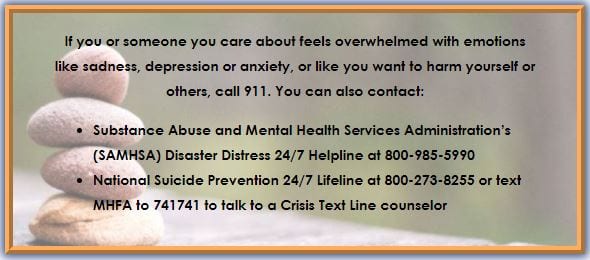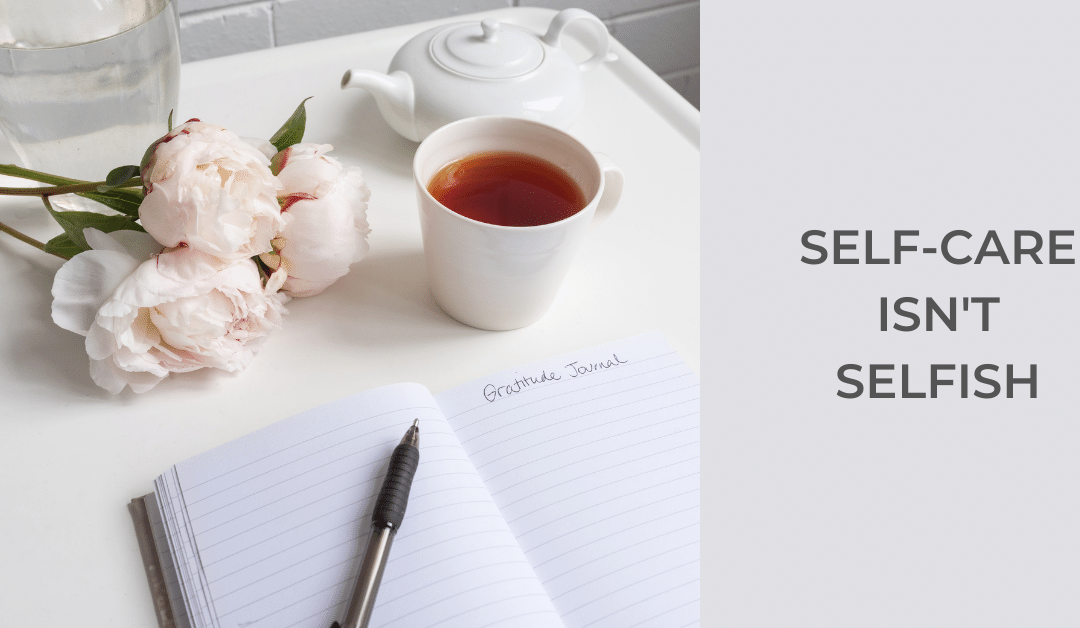So, how are you?
 Let’s face it, months into life during a pandemic, everyone is struggling on some level. A Kaiser poll indicated that over 50% of Americans report that the pandemic and social-distancing are affecting their mental health. More people report that they are experiencing depression and anxiety. Emergency hotlines have noted over a 1000% increase in calls in comparison to 2019. If you need help, please get help.
Let’s face it, months into life during a pandemic, everyone is struggling on some level. A Kaiser poll indicated that over 50% of Americans report that the pandemic and social-distancing are affecting their mental health. More people report that they are experiencing depression and anxiety. Emergency hotlines have noted over a 1000% increase in calls in comparison to 2019. If you need help, please get help.
According to the Centers for Disease Control and Prevention (CDC), the COVID-19 pandemic can cause strong feelings of stress for adults and children, including:
- Fear & worry about your own health & the health of your loved ones
- Changes in sleep or eating patterns
- Difficulty sleeping or concentrating
- Worsening of chronic physical health problems
- Worsening of mental health conditions
If you’re experiencing any of these, there are ways to manage your symptoms and cope while maintaining physical distancing.

Continued from Newsletter…
 The National Alliance on Mental Illness (NAMI) offers several steps you can take to prevent this stressful time from impacting your mental health.
The National Alliance on Mental Illness (NAMI) offers several steps you can take to prevent this stressful time from impacting your mental health.
1) Maintain A Routine
If you’re not used to working from home, you may find the transition challenging. Creating a new teleworking routine will help you get into the right mindset, feel more productive and keep the boundaries between work and home from blurring. Bringing structure into your daily routine is key.
2) Take Reasonable Safety Precautions, But Don’t Go Overboard
Use only reliable sources of information, such as the CDC or Johns Hopkins University, to inform and make a plan for your health habits. Don’t let anxiety direct your behavior. Limit how much time you spend watching or listening to news that makes you upset.
3) Find Ways To “Get Going”
Now more than ever, you need to practice self-care. Practicing sound mental hygiene can help boost your psychological immunity. If you are prone to depression, you might be finding it harder to get out of bed in the morning, motivate yourself to accomplish chores or get started on a work project.
4) Try Not To Fixate On Sleep
The changes in your usual schedule, together with anxiety, can wreak havoc on your sleep. It might be helpful to listen to a guided meditation available on YouTube or one of the many meditation apps, such as 10% Happier, Headspace or the UCLA Center for Mindfulness
5) Stick To Consistent Meal Times
Eating only at meal times, rather than stress-snacking throughout the day, can also help you maintain your mental and physical wellbeing. Nourish yourself with healthy foods. However, it’s also perfectly fine to enjoy some comfort foods, like freshly baked cookies. Now is not the time to start a restrictive diet.
6) Follow Your Regular Mental Health Treatment Plan
Make sure you have an adequate supply of medication and take it as prescribed. Many mental health providers are now offering tele-therapy, either by phone or video, to comply with social distancing requirements. If you are dealing with cancer or a chronic illness, please keep connected to your healthcare provider by virtual visits or in person if safety permits (Bag It). Check with your insurer to see what virtual services they will cover.
7) Practice Mindfulness And Acceptance Techniques
 Whether you use meditation, yoga or prayer, focusing your attention on the present moment, rather than worrying about a catastrophic, uncertain future, can help you manage your distress. One good introductory resource, among many, is “Mindfulness: An Eight-Week Plan for Finding Peace in a Frantic World,” by Mark Williams and Danny Penman. The UCSD Center for Mindfulness also has free, guided meditations and useful information about the practice.
Whether you use meditation, yoga or prayer, focusing your attention on the present moment, rather than worrying about a catastrophic, uncertain future, can help you manage your distress. One good introductory resource, among many, is “Mindfulness: An Eight-Week Plan for Finding Peace in a Frantic World,” by Mark Williams and Danny Penman. The UCSD Center for Mindfulness also has free, guided meditations and useful information about the practice.
8) Be Kind To Yourself
A vast body of research conducted by the psychologist Kristin Neff and colleagues has shown the value of self-compassion for coping with emotional challenges and adversity. To ease feelings of isolation, acknowledge your struggle with kindness, rather than self-judgment, and recognize that millions of people world-wide are sharing your experience right now.


Recent Comments